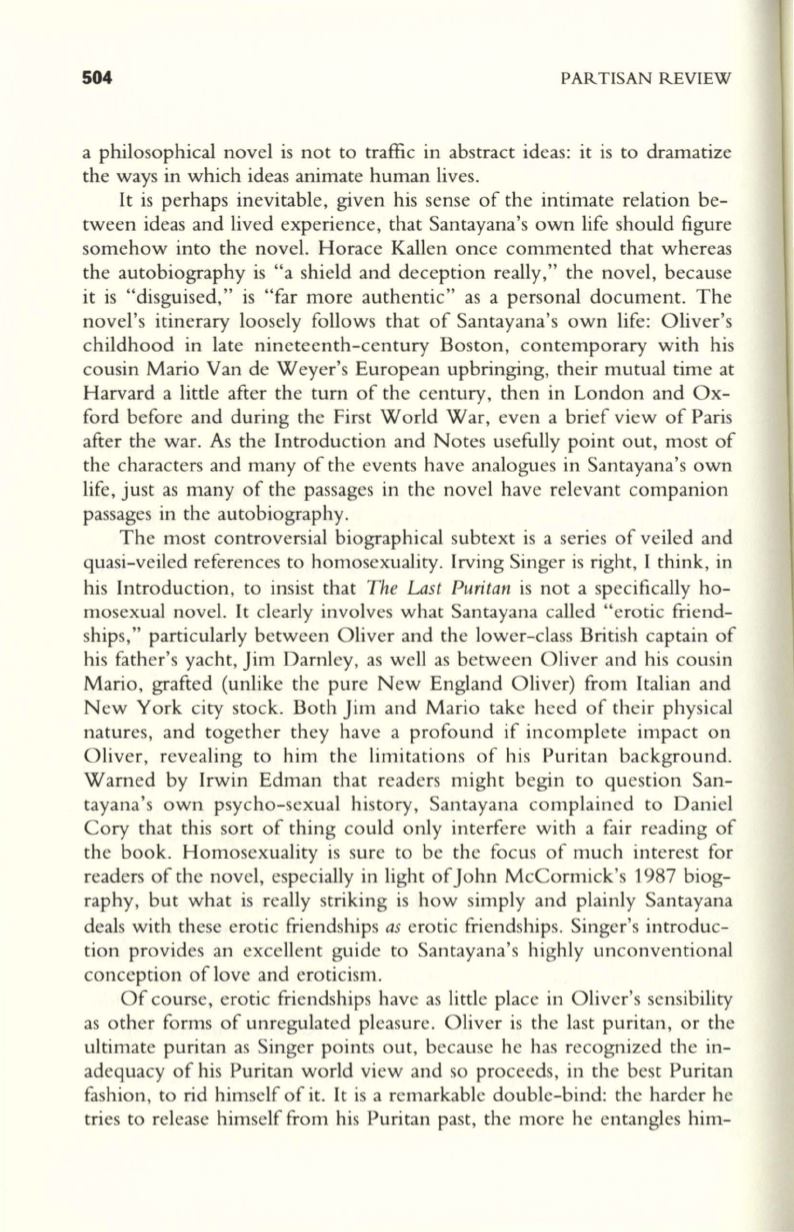
504
PARTISAN REVIEW
a philosophical novel is not to traffic in abstract ideas: it is to dramatize
the ways in which ideas animate human lives.
It is perhaps inevitable, given his sense of the intimate relation be–
tween ideas and lived experience, that Santayana's own life should figure
somehow into the novel. Horace Kallen once commented that whereas
the autobiography is "a shield and deception really," the novel, because
it is "disguised," is "far more authentic" as a personal document. The
novel's itinerary loosely follows that of Santayana's own life: Oliver's
childhood in late nineteenth-century Boston, contemporary with his
cousin Mario Van de Weyer's European upbringing, their mutual time at
Harvard a little after the turn of the century, then in London and Ox–
ford before and during the First World War, even a brief view of Paris
after the war. As the Introduction and Notes usefully point out, most of
the characters and many of the events have analogues in Santayana's own
life, just as many of the passages in the novel have relevant companion
passages in the autobiography.
The most controversial biographical subtext is a series of veiled and
quasi-veiled references to homosexuality. Irving Singer is right, I think, in
his Introduction, to insist that
The LAst Puritan
is not a specifically ho–
mosexual novel.
It
clearly involves what Santayana called "erotic friend–
ships," particularly between Oliver and the lower-class British captain of
his father's yacht, Jim Darnley, as well as between Oliver and his cousin
Mario, grafted (unlike the pure New England Oliver) from Italian and
New York city stock. Both Jim and Mario take heed of their physical
natures, and together they have a profound if incomplete impact on
O liver, revealing to him the limitations of his Puritan background.
Warned by Irwin Edman that readers might begin to question San–
tayana's own psycho-sexual history, Santayana complained to Daniel
Cory that this sort of thing could only interfere with a fair reading of
the book. Homosexuality is sure to be the focus of much interest for
readers of the novel, especially in light ofJohn McCormick's 1987 biog–
raphy, but what is really striking is how simply and plainly Santayana
deals with these erotic friendships
as
erotic friendships. Singer's introduc–
tion provides an excellent guide to Santayana's highly unconventional
conception of love and eroticism.
Of course, erotic friendships have as little place in Oliver's sensibility
as other forms of unregulated pleasure. Oliver is the last puritan, or the
ultimate puritan as Singer points out, because he has recognized the in–
adequacy of his Puritan world view and so proceeds, in the best Puritan
fashion, to rid himself of it. It is a remarkable double-bind: the harder he
tries
to
release himself from his Puritan past, the more he entangles him-


